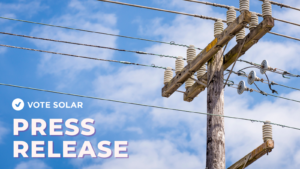Press Release: Clean Energy Group on Duke Energy IRP

Citizens Action Coalition, supported by Earthjustice and Vote Solar, Urge Duke Energy to Improve Public Input Opportunities & Pursue Cleaner, Affordable Alternative Path
Duke Energy’s IRP failed to cooperate with stakeholders and will result in Hoosiers paying more for dirtier energy.
Indianapolis, IN — According to comments and reports submitted by Citizens Action Coalition of Indiana (CAC), in partnership with Earthjustice and Vote Solar, Duke Energy Indiana (Duke) failed to comply with the Indiana Utility Regulatory Commission’s (IURC) rules governing Integrated Resource Plans (IRPs). Duke broke the rules by declining to properly provide opportunities for public engagement in their 2021 Integrated Resource Plan.
“Our report identified significant areas of concern with Duke’s IRP. At present, we cannot place trust in the current iteration of Duke’s IRP, as it was made with incorrect modeling assumptions and little stakeholder input,” Kerwin Olson, Executive Director at CAC. “We urge Duke to reassess their priorities and revise their process to create an improved IRP that centers the public and pursues ratepayer savings over shareholder profits.”
Duke filed their 2021 IRP with the Indiana Utility Regulatory Commission on December 15, 2021. The IRP serves as a guide for future energy efficiency, generation, transmission, and distribution investments. The goal is to develop an efficient, cost-effective, publicly-supported plan that will benefit their 860,000 customers. Despite public calls for a fossil-free economy and proof that closing coal plants is cost-effective, the current IRP proposes the creation of new fossil gas plants, while maintaining coal use until 2035.
CAC, with assistance from Earthjustice and Vote Solar, commented on the IRP by focusing on Duke’s public engagement strategy and their faulty modeling assumptions. Duke should consider an approach that fully abides by Indiana’s IRP rules promoting public participation and transparency. Community stakeholders did not have sufficient opportunities for public engagement since Duke failed to meet all IRP rules for community meetings and information sharing.
“We ask Duke to cooperate with stakeholders and ensure public input is heard,” said Will Kenworthy, Regulatory Director at Vote Solar. “We and our allies will continue to watch closely, to ensure that Duke creates an IRP that benefits the community and not just their bottom line. Our alternative plan shows that a combination of wind, solar, and energy efficiency is the most affordable way forward.”
During the stakeholder engagement process, Duke failed to facilitate a two-way exchange of information and ideas, leaving stakeholders unaware of essential components of the plan. This failure impeded the public from countering substandard models depicting Indiana’s energy future. “It felt like a predetermined path to a premeditated outcome,” said Olson.
When stakeholders were able to participate and provide feedback, Duke declined to incorporate their feedback. Community stakeholders who participated in meetings conducted by Duke expressed the need to improve the data modeling approach and inputs. Duke disagreed and often failed to take the suggestions. To address this issue, Duke needs to reopen the public engagement process, allow for suggestions, and integrate the input received.
CAC, with Earthjustice and Vote Solar, submitted an alternate plan that aligned with public sentiment, called the Citizens Action Coalition (CAC) Preferred Plan, with a path that reduces costs, lowers emissions of harmful pollutants and greenhouse gases, and does not require the construction of additional baseload fossil gas generation. The report used Duke’s modeling assumptions, inputs, and software to develop a model that accurately reflected market conditions and prices. The end result was the CAC Preferred Plan that accelerates the retirement or conversion of remaining coal plants, accelerates the expansion of renewables, prioritizes energy efficiency and demand response, and does not depend on additional, risky new gas plants.
The only clean, affordable, and safe way forward is with renewable energy. CAC, Earthjustice, and Vote Solar strongly urge Duke to end their reliance on fossil fuels, stop burning coal at the Edwardsport power plant, abandon plans for new fossil fuel plans, transition to clean energy, and work constructively with all stakeholders.
# # #
The report on the Duke IRP submitted by CAC, EarthJustice, and Vote Solar is available here.
The CAC Preferred Plan submitted by CAC, EarthJustice, and Vote Solar is available here.
Contact:
Ben Inskeep, Citizens Action Coalition, 317-735-7741, binskeep@citact.org
Emerald Sage, Vote Solar, 443-952-1114, esage@votesolar.org

